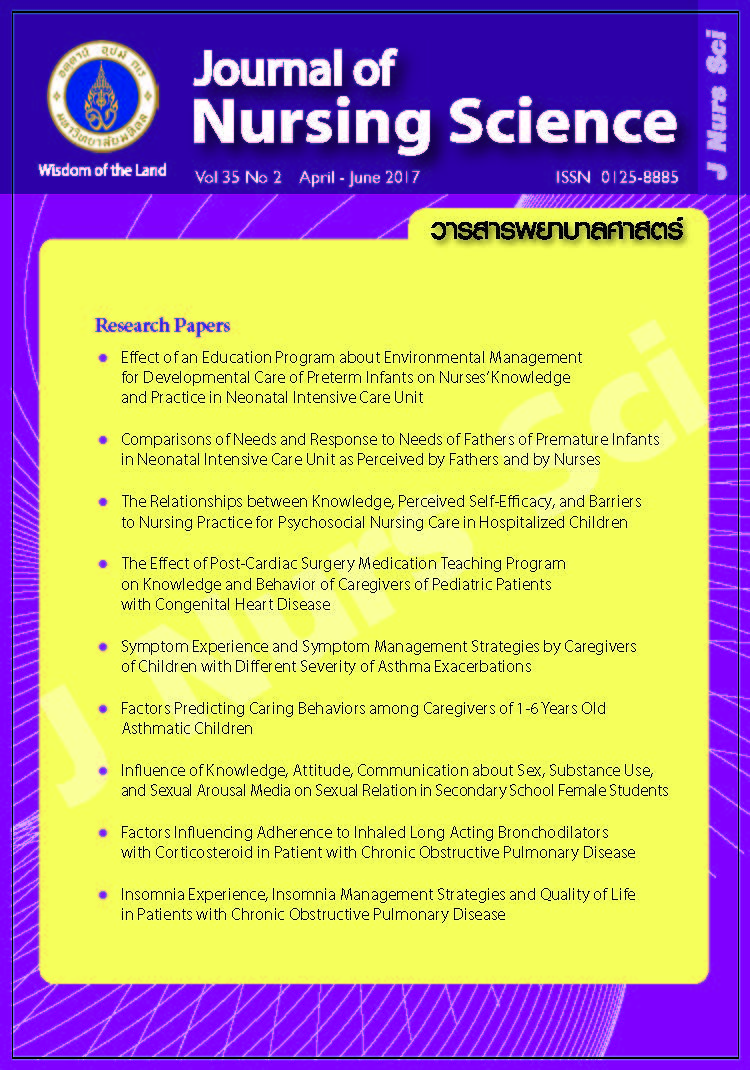Effect of an Education Program about Environmental Management for Developmental Care of Preterm Infants on Nurses’ Knowledge and Practice in Neonatal Intensive Care Unit
Main Article Content
Abstract
Abstract
Purpose: This study aimed to compare mean scores of nurses’ knowledge in environmental management for the developmental care of preterm infants before receiving the education program, immediately and four weeks after receiving the education program; and to compare mean scores of nurses’ practice before receiving the education program and at four weeks after receiving the education program.
Design: A quasi-experimental, one group pretest-posttest design.
Methods: The sample included 27 nurses working in neonatal intensive care units at two tertiary hospitals. Nurses were arranged to watch the video, the researcher summarized and discussed, provided the practice guideline and reminded nurses by the poster. Four weeks after the program, the knowledge questionnaire and observation form were assessed. The data were analyzed
by Friedman Test and paired t-test. Main findings: There is statistically significant difference of mean scores of knowledge in environmental anagement for the developmental care of preterm infants before the program, immediately after the program and at 4 weeks after the program (X2 = 38.49, p < .05). The sample had a higher mean score of practice after the program than before the program (p < .05).
Conclusion and recommendations: Nurses in neonatal intensive care units should obtain knowledge to promote environmental management for the developmental care of preterm infants in order to enhance quality of care for preterm infants.
Keywords: education program, environmental management for developmental care, preterm infants, neonatal intensive care unit
ผลของโปรแกรมการให้ความรู้เรื่องการจัดสิ่งแวดล้อมเพื่อส่งเสริมพัฒนาการทารกเกิดก่อนกำหนดต่อความรู้ และการปฏิบัติของพยาบาล ในหออภิบาลทารกแรกเกิด
บทคัดย่อ
วัตถุประสงค์: เพื่อเปรียบเทียบค่าเฉลี่ยคะแนนความรู้ของพยาบาลในการจัดสิ่งแวดล้อมเพื่อส่งเสริมพัฒนาการทารกเกิดก่อนกำหนดก่อนได้รับโปรแกรมการให้ความรู้หลังได้รับโปรแกรมฯ ทันทีและหลังได้รับโปรแกรมฯ 4 สัปดาห์ และเปรียบเทียบค่าเฉลี่ยคะแนนการปฏิบัติของพยาบาลในการจัดส่ิ่งแวดล้อเพื่อส่งเสริมพัฒนาการทารกเกิดก่อนกำหนด ก่อนได้รับโปรแกรมการให้ความรู้ และหลังได้รับโปรแกรมฯ 4 สัปดาห์
รูปแบบการวิจัย: การวิจัยกึ่งทดลองแบบหนึ่งกลุ่ม วัดผลก่อนและหลังการทดลอง
วิธีดำเนินการวิจัย: กลุ่มตัวอย่าง คือ พยาบาลวิชาชีพ จำนวน 27 ราย ที่ปฏิบัติงานในหออภิบาลทารกแรกเกิดโรงพยาบาลระดับตติยภูมิ 2 แห่ง โดยให้พยาบาลชมสื่อวีดิทัศน์ สรุปและเปิดโอกาสให้ซักถามข้อสงสัย ให้แนวทางในการปฏิบัติ กระตุ้นเตือนด้วยโปสเตอร์ หลังจากนั้น 4 สัปดาห์ ประเมินความรู้ของพยาบาลโดยใช้แบบสอบถามความรู้และประเมินการปฏิบัติของพยาบาลโดยใช้แบบสังเกต วิเคราะห์ข้อมูลด้วยสถิติ Friedman Test และ Paired t-testผลการวิจัย : กลุ่มตัวอย่างมีค่าเฉลี่ยคะแนนความรู้ในการจัดสิ่งแวดล้อม เพื่อส่งเสริมพัฒนาการทารกเกิดก่อนกำหนดในช่วงก่อนได้รับโปรแกรมการให้ความรู้ หลังได้รับโปรแกรมฯ ทันที และหลังได้รับโปรแกรมฯ 4 สัปดาห์ แตกต่างกันอย่างมีนัยสำคัญทางสถิติ (X2 = 38.49, p < .05) กลุ่มตัวอย่างมีค่าเฉลี่ยคะแนนการปฏิบัติหลังได้รับโปรแกรมการให้ความรู้มากกว่าก่อนได้รับโปรแกรมการให้ความรู้ (p < .05)สรปุ และข้อเสนอแนะ: พยาบาลและเจ้าหน้าที่ใหม่ทุกคนที่ปฏิบัติงานในหออภิบาลทารกแรกเกิดควรได้รับการส่งเสริมความรู้ ในการจัดสิ่งแวดล้อมเพื่อส่งเสริมพัฒนาการทารกเกิดก่อนกำหนด รวมถึง การจัดอบรมฟื้นฟูความรู้ให้กับพยาบาล เพื่อสามารถนำไปพัฒนาการปฏิบัติการพยาบาลแก่ทารกเกิดก่อนกำหนดได้อย่างมีคุณภาพคำสำคัญ: โปรแกรมการให้ความรู้ การจัดสิ่งแวดล้อมเพื่อส่งเสริมพัฒนาการ ทารกเกิดก่อนกำหนด หออภิบาลทารกแรกเกิดArticle Details
Copyright Notice: Nursing Science Journal of Thailand has exclusive rights to publish and distribute the manuscript and all contents therein. Without the journal’s permission, the dissemination of the manuscript in another journal or online, and the reproduction of the manuscript for non-educational purpose are prohibited.

Disclaimer: The opinion expressed and figures provided in this journal, NSJT, are the sole responsibility of the authors. The editorial board bears no responsibility in this regard.


